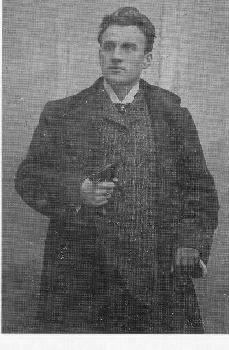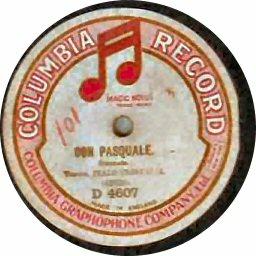Italo Cristalli
8 October 1879 Piacenza – 16 January 1932 Castel San Giovanni
In RA format
Cristalli's scarce discographical legacy (some of the Edisons have survived as test pressings, though, and have been published
on LP and CD) stands in marked contrast to his important career.
He first studied, despite his humble origins and with the help of a local patron, at a college of music in Piacenza, and anyway
made his first stage experiences early on, in 1899 and 1900,
although sources differ widely as to whether he sang comprimario roles in Piacenza, operetta with a touring company, or Rodolfo
in Torino plus Alfredo in Palermo.
His "real" debut, though, took only place in 1903 (as Alfredo in Serravalle, Tuscany), after army service and further studies
in Florence. His first major successes came in 1904: Rigoletto with Titta Ruffo and Maria Galvany at the Teatro Pergola in
Florence, and above all Lohengrin in Bergamo under Tullio Serafin's baton. Lohengrin was to become Cristalli's signature role,
it was considered to have no equal on the Italian stage. After appearances in Novara, Ferrara or Pisa, he sang abroad for the
first time in 1905, in St. Petersburg, where he was very successful and stayed several months. In 1906, he was Duca at the
Petruzzelli in Bari, Cavaradossi in Novara, and Siegfried in Götterdämmerung at the Costanzi in Rome, a
resounding triumph; in between, he made his first tour to South America: Santa Fe, Montevideo and, with particular success,
Buenos Aires, where he was to return time and again until 1924. The first months of 1907, he was still in Rome after his
acclaimed Siegfried, and sang
Don José (with his brother Carlo, a baritone comprimario, as Dancaïre) and Aligi in Franchetti's Figlia di
Jorio. The same year, he was Lohengrin in Reggio Emilia and appeared in Loreley at the Regio in Parma, and on 11
November in Bologna, he premiered the opera Paolo e Francesca by Luigi Mancinelli. In 1908, he was back at the Costanzi
in March and April for the very first Roman of performances of Madama Butterfly (with Maria Farneti/Carmen Melis), and
for Sperduti nel buio by Stefano Donaudy (with Maria Farneti and Giuseppe De Luca/Francesco Cigada). He went to South
America again (Santiago del Chile, where he sang Raoul), and in 1909 to Madrid (Rigoletto with Ruffo and Graziella Pareto) and
the Colón in Buenos Aires (Damnation de Faust with De Luca, Boris Godunov with Eugenio Giraldoni). Back to
Italy in December 1909, he scored another Wagnerian triumph as Stolzing at the San Carlo in Naples, where he stayed for a while
and sang another Walter (in Loreley) as well as Pinkerton, Alfredo and Rodolfo, followed by Lohengrin performances in
Florence at the Politeama.
In 1911, he was Lohengrin and Turiddu in his native Piacenza to great acclaim and went to South America another time (adding Osaka
and Boito's Faust to his repertory). On 20 January 1912, he was Folco in one of the two simultaneous Italian premieres of
Isabeau, the one in Venice (conducted by Mascagni himself); however, the "other" Folco (Bernardo De Muro at La Scala)
proved infinitely more successful, although Cristalli repeated the role in Torino and Palermo in 1913, the year when Verdi's
100th birthday was celebrated, occasion on which Cristalli appeared in Oberto in Parma. Abroad, he was in Buenos Aires
in 1912, and from November 1913 to May 1914, in New York City, where he sang both at the Brooklyn Academy of Music and at
the Met: Rodolfo, Edgardo, Turiddu, Alfredo, Ernesto, Clitandro (in L'amore medico by Wolf-Ferrari) and Italienischer
Sänger. His New York success was reasonable but not overwhelming, so he went back to Italy.
In December 1914, he sang in Loreley in Florence, in February 1915 in L'amico Fritz at the Teatro Quirino in Rome,
conducted by Mascagni and with Gabriella Besanzoni – but not, as planned, in Giordano's Madame Sans-Gêne in
Torino, where he was substituted by Rinaldo Grassi for unknown reasons but most
probably because of vocal inadequacy: Cristalli's voice degraded early and quickly, according to contemporary accounts because
of constant sexual eccesses. In January
1917, he was Fenton in Brescia, and in late 1918, Paolino in Il matrimonio segreto in Torino. His last prominent
appearances, apart from further tours to Buenos Aires, were twelve Lohengrin performances at the Teatro Costanzi in November and
December 1920. He sang on, mostly in the Italian provinces, until bidding farewell to the stage as Werther in Piacenza in 1926.
His last years were spent in bitter poverty; he had to beg for bread and a hot meal.
Reference 1: Dizionario biografico degli italiani, vol. 31, Roma 1985; reference 2: Kutsch & Riemens; reference 3; reference 4; reference 5: Rome Opera archives
Discography
Fonotipia, Milano, 12 December 1908
xPh3749 Mefistofele (Boito): Dai campi unpublished
Edison, London, October 1910
413A Cavalleria rusticana (Mascagni): Tu qui, Santuzza? (w. Garibaldi) unpublished
413B Cavalleria rusticana (Mascagni): No, no, Turiddu (w. Garibaldi) unpublished
419 Traviata (Verdi): Dei miei bollenti spiriti unpublished
Edison, London, November 1910
424A Carmen (Bizet): Il fior che avevi a me tu dato unpublished
429A Lohengrin (Wagner): Da voi lontan unpublished
431 Gioconda (Ponchielli): Cielo e mar unpublished
435A Bohème (Puccini): Addio, dolce svegliare (w. Farneti, Rasponi, Garibaldi), pt. 1 unpublished
435B Bohème (Puccini): Addio, dolce svegliare (w. Farneti, Rasponi, Garibaldi), pt. 2 unpublished
436 Tosca (Puccini): E lucevan le stelle unpublished
437 Iris (Mascagni): Apri la tua finestra unpublished
441A Madama Butterfly (Puccini): Bimba dagli occhi (w. Farneti) unpublished
442 Pagliacchi (Leoncavallo): Vesti la giubba unpublished
Columbia, Milano, about 1919
42339 Don Pasquale (Donizetti): Com'è gentil D4607
42341 Don Pasquale (Donizetti): Sogno soave e casto D4607
Source: Gesellschaft für historische Tonträger, Wien
I wish to thank Roberto Marcocci for the picture.
I wish to thank Richard J Venezia for the recording.
|

